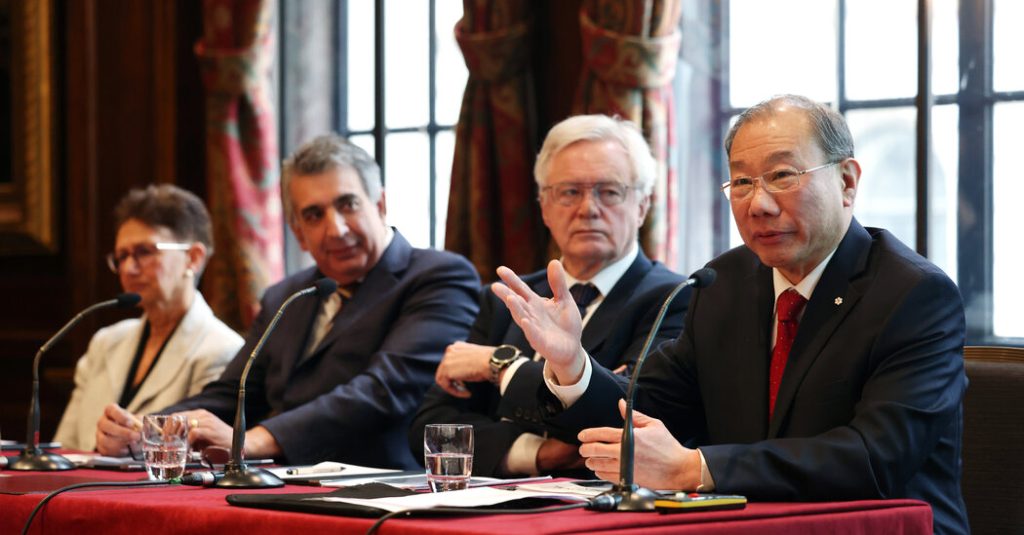The 2023 conviction of British nurse Lucy Letby for the murder of seven infants has been thrown into serious doubt by an international panel of 14 neonatal and pediatric specialists. Led by Canadian neonatologist Dr. Shoo Lee, the panel conducted an extensive independent review of the medical records related to the babies in the case and concluded that there was no medical evidence to support the accusations of malfeasance. Dr. Lee categorically stated that the panel found no evidence of murder in any of the 17 cases considered during the trial. This startling revelation comes after Ms. Letby was sentenced to a whole-life order, meaning she would spend the rest of her life in prison, for the murders and attempted murders of babies at the Countess of Chester Hospital’s neonatal unit. Ms. Letby has steadfastly maintained her innocence throughout the proceedings.
The panel’s findings, delivered pro bono, highlight not only the lack of evidence against Ms. Letby, but also point to significant systemic failings within the neonatal unit at the Countess of Chester Hospital. The experts identified serious errors in medical care and chronic mismanagement of neonatal conditions, concluding that some of the infant deaths were preventable. Their assessment underscores the possibility that the vulnerable infants succumbed to natural causes exacerbated by inadequate medical attention, rather than malicious intent. The review casts a significant shadow over the prosecution’s case, raising concerns about the reliability of the evidence presented during the trial.
At the heart of the controversy is the expert testimony presented by Dr. Dewi Evans, the prosecution’s lead expert witness. Dr. Evans heavily relied on a 1989 academic paper co-authored by Dr. Lee concerning air embolisms in infants. Dr. Evans argued that some of the babies exhibited skin discoloration patterns consistent with air embolisms, implying deliberate injection of air by Ms. Letby. However, Dr. Lee has since stated that his research was misinterpreted by Dr. Evans and that none of the babies in the trial should have been diagnosed with air embolism. While Dr. Lee offered to testify in Ms. Letby’s appeal, the appeals court rejected his evidence, arguing that the defense should have called him during the original trial.
The panel meticulously examined each baby’s case, highlighting specific examples of misdiagnosis and mistreatment. In the case of “Baby 1,” attributed by the prosecution to air injection, the panel identified thrombosis from a pre-existing condition as the cause of death. “Baby 9,” also allegedly killed by air injection, died from respiratory complications related to chronic lung disease, according to the panel, who noted that the death was potentially preventable. They further cited numerous errors in the baby’s treatment. In another case, “Baby 11,” where the prosecution argued deliberate dislodgement of a breathing tube, the panel found no supporting evidence. Instead, they attributed the baby’s deterioration to a traumatic and poorly supervised resuscitation attempt by a consultant who, according to Dr. Lee, “didn’t understand the basics” of the equipment used.
These findings underscore the panel’s broader conclusion that systemic issues within the neonatal unit, including inadequate staffing, delayed diagnoses, and inappropriate or absent treatment, contributed significantly to the babies’ deaths. Panel member Dr. Neena Modi, a neonatology professor at Imperial College London, emphasized the combination of factors contributing to the tragic outcomes, highlighting the babies being delivered in the wrong place, delayed diagnoses, and inadequate treatment. These observations suggest a pattern of systemic failures rather than individual acts of malice. The panel’s report lays bare the potential for misdiagnosis and mistreatment in a stressed healthcare system, raising critical questions about the processes that led to Ms. Letby’s conviction.
Ms. Letby’s lawyer, Mark McDonald, has applied to the Criminal Cases Review Commission, the body responsible for investigating potential miscarriages of justice in the UK. This application follows two unsuccessful attempts to appeal Ms. Letby’s convictions. Mr. McDonald highlighted Dr. Evans’s altered stance on the cause of death for three of the babies as a further reason for review. While the Commission acknowledged the request and stressed the importance of considering the affected families, it emphasized its role is not to determine guilt or innocence, but to assess potential miscarriages of justice. This development offers a glimmer of hope for Ms. Letby, whose lawyer stated she maintains hope despite the daunting legal challenges ahead. The review process by the commission will likely be lengthy and complex, involving a thorough examination of the evidence and the trial proceedings.


